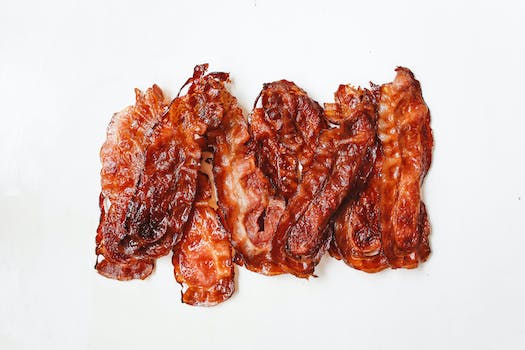
A low carb meal plan is an effective way to improve your health and achieve weight loss goals. By reducing the intake of carbohydrates and focusing on nutrient-rich foods, you can optimize your metabolism and maintain stable blood sugar levels. In this ultimate guide, we will explore the benefits of a low carb meal plan, provide practical tips for creating and following a meal plan, and offer delicious recipe ideas to keep you motivated on your journey to a healthier lifestyle.
- 1. Introduction
- 1.1. What is a low carb meal plan?
- 1.2. Benefits of following a low carb meal plan
- 1.3. How to get started with a low carb meal plan
- 1.4. Common misconceptions about low carb diets
- 1.5. Importance of consulting a healthcare professional
- 2. Key Components of a Low Carb Meal Plan
- 2.1. Choosing the right carbohydrates
- 2.2. Incorporating protein-rich foods
- 2.3. Including healthy fats
- 2.4. Prioritizing fiber-rich vegetables
- 2.5. Avoiding processed and sugary foods
- 3. Sample Low Carb Meal Plan
- 3.1. Breakfast options
- 3.2. Lunch ideas
- 3.3. Dinner suggestions
- 3.4. Snack choices
- 3.5. Beverage recommendations
1. Introduction
A low carb meal plan is a dietary approach that focuses on reducing the consumption of carbohydrates in order to promote weight loss and improve overall health. This type of meal plan is commonly followed by individuals who are looking to manage their weight, control their blood sugar levels, or improve their metabolic health. By reducing the intake of carbohydrates, the body is forced to burn stored fat for energy, resulting in weight loss. In addition, a low carb meal plan can help stabilize blood sugar levels and reduce cravings, making it an effective strategy for individuals with diabetes or insulin resistance. This ultimate guide will provide you with all the information you need to create and follow a low carb meal plan that suits your preferences and health goals.
1.1. What is a low carb meal plan?
A low carb meal plan is a dietary approach that focuses on reducing the consumption of carbohydrates, particularly those found in processed and refined foods. It involves choosing foods that are low in carbs and high in protein and healthy fats. The purpose of a low carb meal plan is to promote weight loss, improve blood sugar control, and enhance overall health.
By limiting the intake of carbs, the body is forced to burn stored fat for energy instead of relying on glucose from carbohydrates. This metabolic state is known as ketosis. Low carb meal plans typically emphasize the consumption of lean meats, fish, eggs, non-starchy vegetables, nuts, and seeds while minimizing or avoiding foods like grains, sugary snacks, and sugary beverages.
Many people follow a low carb meal plan to achieve weight loss goals, manage diabetes or prediabetes, reduce inflammation, and improve heart health. However, it is important to consult with a healthcare professional or registered dietitian before starting any new dietary regimen to ensure it aligns with individual needs and health conditions.
1.2. Benefits of following a low carb meal plan
A low carb meal plan offers numerous benefits for those looking to improve their overall health and well-being. By reducing the intake of carbohydrates, such as bread, pasta, and sugary foods, individuals can experience various positive effects on their body and mind.
One of the primary benefits of following a low carb meal plan is weight loss. Carbohydrates are the main source of energy for the body, and when consumed in excess, they can lead to weight gain. By limiting carb intake, the body is forced to burn stored fat for energy, resulting in weight loss.
Additionally, a low carb meal plan can help stabilize blood sugar levels. When we consume high-carb foods, our blood sugar levels spike, causing a rapid increase in energy followed by a crash. This rollercoaster effect can lead to cravings, fatigue, and mood swings. By reducing carb intake, blood sugar levels remain more stable, providing a steady and sustained release of energy.
Furthermore, a low carb meal plan has been shown to improve heart health. High carb diets, especially those high in refined sugars, have been linked to an increased risk of heart disease and high cholesterol levels. By choosing low carb alternatives, such as lean proteins, healthy fats, and non-starchy vegetables, individuals can reduce their risk of developing these conditions and promote a healthier heart.
Another advantage of following a low carb meal plan is improved mental clarity and focus. Carbohydrate-rich foods can cause brain fog and hinder cognitive function. By adopting a low carb diet, individuals may experience enhanced mental clarity, improved concentration, and increased productivity.
In conclusion, a low carb meal plan offers a wide range of benefits, including weight loss, stabilized blood sugar levels, improved heart health, and enhanced mental clarity. By making conscious choices to reduce carb intake and opt for healthier alternatives, individuals can experience significant improvements in their overall well-being.
1.3. How to get started with a low carb meal plan
A low carb meal plan is a dietary approach that focuses on reducing the intake of carbohydrates and increasing the consumption of proteins and healthy fats. This type of eating plan has gained popularity in recent years due to its potential benefits for weight loss, blood sugar control, and overall health. By limiting the amount of carbs you consume, your body is forced to burn stored fat for energy, which can lead to weight loss. Additionally, low carb meal plans can help stabilize blood sugar levels, which is especially beneficial for individuals with diabetes or insulin resistance. In this article, we will guide you on how to get started with a low carb meal plan, providing you with practical tips and delicious recipe ideas to make your journey easier and more enjoyable.
1.4. Common misconceptions about low carb diets
Low carb diets have gained popularity in recent years as a way to lose weight and improve overall health. However, there are several common misconceptions surrounding this type of diet that need to be addressed. In this article, we will debunk these misconceptions and provide you with the ultimate guide to a low carb meal plan. Whether you’re just starting out on a low carb diet or looking for ways to optimize your current meal plan, this guide will provide you with all the information you need to succeed.
1.5. Importance of consulting a healthcare professional
A low carb meal plan has gained immense popularity in recent years due to its numerous health benefits. From weight loss to improved blood sugar control, a low carb diet has been proven to be effective in managing various health conditions. However, before embarking on any dietary changes, it is crucial to consult a healthcare professional. Seeking advice from a qualified healthcare professional ensures that any potential risks or complications are assessed, and a personalized meal plan is designed based on individual needs and goals. This section will discuss the importance of consulting a healthcare professional before starting a low carb meal plan and why their expertise is invaluable in achieving long-term success.
2. Key Components of a Low Carb Meal Plan
A low carb meal plan involves focusing on foods that are low in carbohydrates while still providing essential nutrients. The key components of a low carb meal plan include:
1. Protein-rich foods: Incorporating protein into each meal is important as it helps to keep you feeling full and satisfied. Good sources of protein include lean meats, poultry, fish, eggs, and tofu.
2. Non-starchy vegetables: These are low in carbs and high in fiber, making them a great addition to a low carb meal plan. Examples include leafy greens, broccoli, cauliflower, zucchini, and bell peppers.
3. Healthy fats: Including healthy fats in your low carb meal plan is essential for providing energy and promoting satiety. Avocados, olive oil, nuts, and seeds are all excellent sources of healthy fats.
4. Low carb fruits: While fruits contain natural sugars, some are lower in carbs than others. Berries such as strawberries, blueberries, and raspberries are good options for a low carb meal plan.
5. Whole grains (optional): If you choose to include grains in your low carb meal plan, opt for whole grains such as quinoa, brown rice, or oats. These provide more fiber and nutrients compared to refined grains.
By incorporating these key components into your low carb meal plan, you can create a well-rounded and satisfying diet that supports your health and weight management goals.
2.1. Choosing the right carbohydrates
Choosing the right carbohydrates is an important aspect of creating a low carb meal plan. When following a low carb diet, it is essential to select carbohydrates that are nutrient-dense and have a low glycemic index. The glycemic index is a measure of how quickly a carbohydrate raises blood sugar levels. Foods with a low glycemic index are digested and absorbed more slowly, leading to a gradual rise in blood sugar levels.
Aim to include carbohydrates that are rich in fiber, vitamins, and minerals. These include whole grains such as quinoa, brown rice, and oats. Vegetables like broccoli, spinach, and cauliflower are also excellent choices as they are low in carbs and high in nutrients.
It is important to avoid or limit refined carbohydrates such as white bread, pasta, and sugary snacks. These foods are high in simple sugars and can cause a rapid spike in blood sugar levels. Opt for healthier alternatives like whole wheat bread, zucchini noodles, and fresh fruits for a more balanced low carb meal plan.
Remember, the key is to choose carbohydrates that provide sustained energy and keep you feeling full for longer periods. This will help you maintain stable blood sugar levels and support your overall health and weight management goals.
2.2. Incorporating protein-rich foods
Incorporating protein-rich foods is an essential aspect of a low carb meal plan. Proteins play a significant role in our body’s overall health and well-being. They are the building blocks of our cells, tissues, and organs. When following a low carb meal plan, it is important to ensure that you are consuming enough protein to support muscle growth, repair, and maintenance. Additionally, protein helps to keep you feeling fuller for longer, which can aid in weight management and prevent unnecessary snacking.
There are plenty of protein-rich foods that you can incorporate into your low carb meal plan. Some excellent options include lean meats such as chicken breast, turkey, and beef. Seafood such as salmon, tuna, and shrimp are also great sources of protein. For those following a vegetarian or vegan low carb meal plan, plant-based protein sources like tofu, tempeh, and edamame are ideal choices.
In addition to animal and plant-based proteins, dairy products like Greek yogurt, cottage cheese, and eggs are excellent sources of protein. They are versatile and can be incorporated into a variety of low carb meals. Nuts and seeds like almonds, walnuts, chia seeds, and flaxseeds are also protein-rich additions to a low carb meal plan.
When planning your low carb meals, aim to include a protein source with each meal and snack. This will help to balance your blood sugar levels and keep you feeling satisfied throughout the day. Remember to choose lean protein sources and avoid processed meats that may contain added sugars or unhealthy fats. By incorporating protein-rich foods into your low carb meal plan, you can ensure that you are meeting your nutritional needs while enjoying a variety of delicious and satisfying meals.
2.3. Including healthy fats
Including healthy fats in a low carb meal plan is crucial for maintaining a balanced and nutritious diet. While many people associate low carb diets with cutting out all fats, it is important to understand that not all fats are created equal. In fact, some fats are essential for our overall health and well-being.
Healthy fats, such as monounsaturated fats and polyunsaturated fats, are known to provide numerous health benefits. They can help lower bad cholesterol levels, improve heart health, and even aid in weight loss. These fats are found in foods like avocados, nuts, seeds, and fatty fish.
Incorporating these healthy fats into your low carb meal plan can help you feel satisfied and provide you with a steady source of energy throughout the day. They also add flavor and richness to your meals, making them more enjoyable.
When planning your low carb meals, be sure to include sources of healthy fats. For example, you can add avocado slices to your salads, snack on a handful of nuts, or cook with olive oil. Remember, moderation is key, so be mindful of portion sizes and balance your fat intake with other essential nutrients.
By including healthy fats in your low carb meal plan, you can optimize your nutrition and enhance the effectiveness of your diet. So, don’t be afraid to embrace these beneficial fats and enjoy the many benefits they have to offer!
2.4. Prioritizing fiber-rich vegetables
Including fiber-rich vegetables in a low carb meal plan is essential for maintaining a balanced and healthy diet. These vegetables not only provide necessary nutrients but also aid in digestion and promote satiety. When prioritizing fiber-rich vegetables, it is important to choose those that are low in carbohydrates but high in fiber content. Here are some key components to consider when selecting fiber-rich vegetables for your low carb meal plan:
1. Leafy Greens: Spinach, kale, lettuce, and other leafy greens are excellent choices as they are low in carbs and packed with fiber. They provide essential vitamins and minerals while keeping your carb intake in check.
2. Cruciferous Vegetables: Broccoli, cauliflower, Brussels sprouts, and cabbage are all great options. These vegetables are not only rich in fiber but also contain beneficial compounds that support overall health.
3. Avocado: This fruit is not only delicious but also an excellent source of fiber. Avocado is low in carbs and high in healthy fats, making it a perfect addition to a low carb meal plan.
4. Bell Peppers: Bell peppers are not only colorful and flavorful but also rich in fiber. They can be enjoyed raw or cooked, making them a versatile choice for any low carb meal.
5. Zucchini: With its mild taste and high fiber content, zucchini is a popular choice for low carb diets. It can be spiralized into noodles or used as a substitute for higher carb ingredients.
Including these fiber-rich vegetables in your low carb meal plan will not only add variety and flavor to your meals but also contribute to your overall health and well-being.
2.5. Avoiding processed and sugary foods
Avoiding processed and sugary foods is a key component of a low carb meal plan. Processed foods often contain high amounts of refined carbohydrates, added sugars, and unhealthy fats, which can quickly spike blood sugar levels and lead to weight gain. By eliminating these foods from your diet, you can maintain stable blood sugar levels and promote weight loss.
Sugary foods, such as candy, soda, and baked goods, are packed with empty calories and offer little to no nutritional value. Consuming these sugary treats can cause rapid blood sugar fluctuations and contribute to cravings and overeating. By cutting out sugary foods, you can reduce your overall carbohydrate intake and improve your body’s ability to burn fat for energy.
Instead of processed and sugary foods, focus on incorporating whole, unprocessed foods into your low carb meal plan. This includes lean proteins like chicken, fish, and tofu, as well as plenty of non-starchy vegetables, such as leafy greens, broccoli, and cauliflower. Healthy fats like avocado, olive oil, and nuts can also be included in moderation.
By making these dietary changes and avoiding processed and sugary foods, you can create a well-rounded low carb meal plan that supports your health and weight loss goals.
3. Sample Low Carb Meal Plan
Here is a sample low carb meal plan to help you get started on your journey towards a healthier lifestyle. This meal plan focuses on reducing carbohydrates while still providing you with delicious and satisfying meals.
3.1. Breakfast options
Here are some breakfast options for a low carb meal plan:
1. Scrambled eggs with vegetables: Start your day with a protein-packed breakfast by scrambling eggs and adding in your favorite low carb vegetables such as spinach, bell peppers, and mushrooms.
2. Avocado and bacon: Slice an avocado and serve it with crispy bacon for a delicious and satisfying breakfast that is high in healthy fats and low in carbs.
3. Greek yogurt with berries: Opt for plain Greek yogurt and top it with a handful of berries like strawberries, blueberries, or raspberries. This combination offers a creamy and sweet breakfast option without loading up on carbs.
4. Chia seed pudding: Mix chia seeds with unsweetened almond milk, a touch of vanilla extract, and a low carb sweetener of your choice. Let the mixture sit overnight in the refrigerator, and enjoy a creamy and nutritious breakfast pudding in the morning.
5. Low carb smoothie: Blend together unsweetened almond milk, a handful of spinach, a scoop of protein powder, and a small portion of low carb fruits like berries or half an avocado. This smoothie provides a quick and easy breakfast option that is low in carbs and high in nutrients.
Remember to choose breakfast options that fit within your daily carb allowance and align with your personal taste preferences. Enjoy your low carb breakfast and start your day off on a healthy note!
3.2. Lunch ideas
Here is a sample low carb meal plan to help you get started on your journey towards a healthier lifestyle. These lunch ideas are not only delicious but also packed with nutrients to keep you energized throughout the day.
Day 1:
– Grilled chicken salad with mixed greens, cherry tomatoes, and sliced avocado
– Baked salmon with roasted asparagus
Day 2:
– Turkey lettuce wraps filled with lean ground turkey, chopped vegetables, and a drizzle of low carb dressing
– Cauliflower fried rice with shrimp and diced vegetables
Day 3:
– Zucchini noodles with marinara sauce and grilled chicken
– Greek salad with feta cheese, olives, cucumbers, and a light vinaigrette
Day 4:
– Spinach and mushroom omelet with a side of bacon
– Tuna salad lettuce wraps with diced celery and mayonnaise
Day 5:
– Grilled steak with steamed broccoli and a side of cauliflower mash
– Egg salad stuffed bell peppers
Remember to adjust portion sizes according to your specific dietary needs and consult a healthcare professional before making any drastic changes to your diet. Enjoy these tasty low carb lunch ideas as part of your overall low carb meal plan!
3.3. Dinner suggestions
For those following a low carb meal plan, dinner can be a delicious and satisfying part of the day. Here are some suggestions for a flavorful and nutrient-rich dinner that is low in carbs:
1. Grilled Chicken with Roasted Vegetables: Marinate chicken breasts in a mixture of olive oil, lemon juice, garlic, and herbs. Grill until cooked through and serve with a side of roasted vegetables like broccoli, cauliflower, and bell peppers.
2. Baked Salmon with Asparagus: Season salmon fillets with salt, pepper, and lemon zest. Bake in the oven and serve with steamed asparagus.
3. Zucchini Noodles with Meatballs: Spiralize zucchini into noodles and sauté them in olive oil. Serve with homemade or store-bought low carb meatballs and marinara sauce.
4. Cauliflower Fried Rice: Pulse cauliflower florets in a food processor until it resembles rice. Sauté with diced vegetables, scrambled eggs, and soy sauce for a tasty low carb alternative to traditional fried rice.
5. Grilled Steak with Salad: Season a steak with salt, pepper, and your favorite spices. Grill to your desired doneness and serve with a side salad of mixed greens, cherry tomatoes, and avocado.
Remember to choose lean protein sources, plenty of non-starchy vegetables, and healthy fats when planning your low carb dinners. These meal ideas will keep you satisfied while helping you stay on track with your low carb eating goals.
3.4. Snack choices
When following a low carb meal plan, it’s important to choose snacks that are not only delicious but also low in carbohydrates. Here are some great snack choices to keep you satisfied throughout the day:
1. Nuts and seeds: Almonds, walnuts, sunflower seeds, and chia seeds are all excellent options. They provide a good amount of healthy fats and protein while being low in carbs.
2. Cheese: Cheese is a versatile snack that can be enjoyed on its own or paired with vegetables. Opt for varieties such as cheddar, mozzarella, or goat cheese, which are lower in carbs.
3. Greek yogurt: Greek yogurt is high in protein and low in carbs, making it a perfect snack choice. Add some berries or a drizzle of honey for extra flavor.
4. Hard-boiled eggs: Hard-boiled eggs are not only convenient but also a great source of protein. They can be enjoyed as a snack or added to salads.
5. Vegetable sticks with dip: Cut up some cucumber, bell peppers, and celery sticks and pair them with a low carb dip like hummus or guacamole.
These snack choices are not only delicious but also fit well into a low carb meal plan. Enjoy them between meals to curb cravings and stay on track with your low carb goals.
3.5. Beverage recommendations
When following a low carb meal plan, it is important to choose beverages that are also low in carbohydrates. Here are some beverage recommendations to complement your low carb meals:
1. Water: The ultimate zero-carb drink, water should be your go-to beverage. It keeps you hydrated and helps with digestion.
2. Unsweetened Tea: Whether it’s green tea, black tea, or herbal tea, opt for unsweetened varieties. They are refreshing and contain no added sugars or carbs.
3. Coffee: Enjoy your coffee black or with a splash of unsweetened almond milk or heavy cream. Avoid adding sugar or flavored syrups.
4. Sparkling Water: If you prefer some fizz, choose sparkling water without any added sugars. You can also add a squeeze of fresh lemon or lime for extra flavor.
5. Broth or Stock: Warm and comforting, a cup of broth or stock can be a satisfying low carb beverage option. Look for options with no added sugars or fillers.
Remember to read labels and choose beverages that are free from sugars, artificial sweeteners, and high carbohydrate content. Staying hydrated while following a low carb meal plan is essential for overall health and success in achieving your goals.
Conclusion
In conclusion, following a low carb meal plan can be a highly effective way to improve overall health and achieve weight loss goals. By reducing the intake of carbohydrates and focusing on nutrient-dense foods, individuals can experience increased energy levels, improved blood sugar control, and enhanced weight management. However, it is important to consult with a healthcare professional or registered dietitian before starting any new meal plan to ensure it aligns with specific dietary needs and goals. With careful planning and commitment, a low carb meal plan can provide numerous health benefits and contribute to a balanced and sustainable approach to eating.



A low carb meal plan can indeed be a powerful tool in optimizing ones health and achieving weight loss objectives. By consciously reducing the consumption of carbohydrates and instead prioritizing nutrient-rich alternatives, individuals can witness significant improvements in their overall well-being. This dietary approach not only aids in weight management but also promotes a more balanced blood sugar level, enhanced energy levels, and increased mental clarity. Moreover, opting for low carb meals can potentially reduce the risk of several chronic diseases, such as type 2 diabetes and heart conditions. Therefore, implementing a well-structured low carb meal plan can be a wise and effective choice for those seeking to improve their health and reach their weight loss goals.